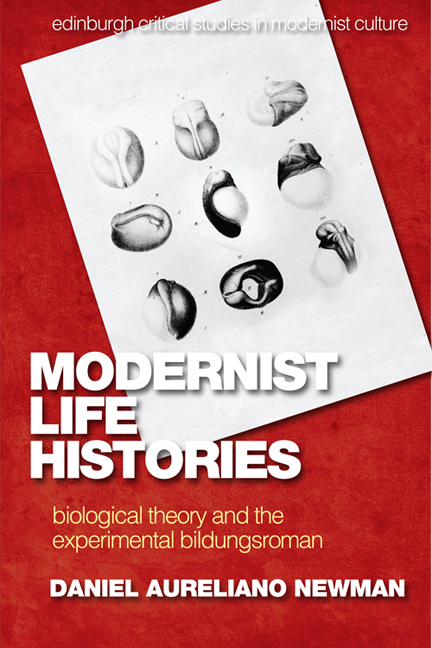Book contents
- Frontmatter
- Contents
- List of Figures
- Preface
- Acknowledgements
- Series Editors’ Preface
- List of Abbreviations
- Introduction
- 1 Bildung, Biology and the Narrative Structure of Development
- 2 A Portrait of the Artist as a ‘Biologist in Words’: Language, Epiphany and Atavistic Bildung
- 3 Mendelian Inheritance, ‘Eternal Differences’ and Entropy in Howards End
- 4 ‘Tampering with the Expected Sequence’: Heterochrony and Sex Change in Orlando
- 5 Anachrony, Neoteny and the ‘Education of an Amphibian’ in Eyeless in Gaza
- 6 Beginning Again: Darwin’s Caterpillar from George Eliot to Beckett
- Conclusion
- Bibliography
- Index
1 - Bildung, Biology and the Narrative Structure of Development
Published online by Cambridge University Press: 23 April 2021
- Frontmatter
- Contents
- List of Figures
- Preface
- Acknowledgements
- Series Editors’ Preface
- List of Abbreviations
- Introduction
- 1 Bildung, Biology and the Narrative Structure of Development
- 2 A Portrait of the Artist as a ‘Biologist in Words’: Language, Epiphany and Atavistic Bildung
- 3 Mendelian Inheritance, ‘Eternal Differences’ and Entropy in Howards End
- 4 ‘Tampering with the Expected Sequence’: Heterochrony and Sex Change in Orlando
- 5 Anachrony, Neoteny and the ‘Education of an Amphibian’ in Eyeless in Gaza
- 6 Beginning Again: Darwin’s Caterpillar from George Eliot to Beckett
- Conclusion
- Bibliography
- Index
Summary
We are born, small and helpless, yet visibly stamped with humanity; day by day we change, but move with certainty in one direction … The changes affect size and structure, character and disposition, but are so orderly and familiar that we accept them without surprise.
– P. Chalmers Mitchell, The Childhood of Animals (1912: 1)I have claimed that biological theories of development participate in the narrative grammar of Bildung and thus in the structure of the Bildungsroman. Elaborating this claim is one purpose in this chapter, which surveys late eighteenth-century models of embryogenesis and their links with contemporary theories of self-cultivation. My point is that the ideal Bildung plot has, like the ontogenetic plot of embryology, a recapitulatory structure. This is not to reduce actual Bildungsromane to a formula, but it should contextualise the formal strategies of nineteenth-century Bildungsromane, as well as their modernist successors, by situating them within a dominant understanding of progressive development and linear time.
The chapter also presents the various forms of biological reversion which supply alternative developmental structures in the modernist Bildungsromane featured in subsequent chapters: atavism, Mendelian throwbacks, sex change, neoteny and interrupted metamorphosis. It will be useful to think of reversions as developmental dynamics which defer maturity or restore immaturity. Atavisms and Mendelian throwbacks are reversions to ancestral conditions which are, in the context of recapitulation, equivalent to immaturity; so is sex change, at least as it occurs in Orlando. Neoteny and interrupted metamorphosis delay or prevent the onset of adulthood. Treating the five forms of reversion together should help compare various biological phenomena which might otherwise seem unrelated.
EPIGENESIS AND THE RECAPITULATORY SHAPE OF LIFE
With apologies to Mr Emerson in A Room with a View, Bildung is not the body, but it is (partly) of the body. Derived from Pietism and associated primarily with the spiritual, idealist and cultural, the modern concept of Bildung also reflects ‘close affinities between the life-sciences and aesthetics models of autopoeiesis around 1800’ (Pfau 2010: 28). Schelling, a central figure of Weimar classicism, theorised that biological processes ‘were isomorphic with those acts delineated subjectively in the self’ (Richards 2002: 116).
- Type
- Chapter
- Information
- Modernist Life HistoriesBiological Theory and The Experimental Bildungsroman, pp. 28 - 53Publisher: Edinburgh University PressPrint publication year: 2018



